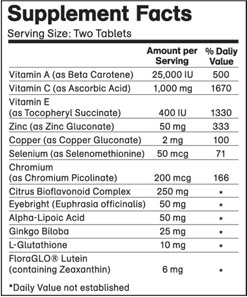 People are often deceived by dietary supplement labels. These labels are intentionally deceptive, and frequently imply that they contain far more of a given substance than they actually do. Pictured right is a standard label for a dietary supplement.
People are often deceived by dietary supplement labels. These labels are intentionally deceptive, and frequently imply that they contain far more of a given substance than they actually do. Pictured right is a standard label for a dietary supplement.
As intended, people easily come to the false conclusion that these pills contain 1 gram (1000 mg.) of vitamin C, but that would be wrong. Always notice the serving size. In this example, the serving size is two tablets, which means that the nutrient information shown is what you would obtain from taking two pills at a time. There's actually only 500 mg. of vitamin C in each tablet. This may not seem particularly disturbing, until one realizes that other companies routinely change the serving sizes to be up to 6 pills. All of their nutrient information would need to be divided by six to get an approximate amount for each ingredient. Unscrupulous supplement companies rely on the fact that most people never notice the serving sizes, and that their customers will assume that they are getting exactly what the nutrient label says for each pill. Some of the more honest supplement companies have the serving size listed as one pill, which is exactly how it should be.
This same deception game happens with our food labels too; so always examine food serving sizes. In some cases, food serving sizes are just a pitiful half of a cup, which is to trick us into believing that the food is nutritious, instead of void of nutrients.
In some cases, a supplement may be acceptable even though it has a large serving size. For instance, our dietary supplements have a serving size of 4 pills, but the amounts are four times larger than they need to be. In other words, it remains a good supplement despite the company's dishonest marketers. It is important to be vigilant when reading supplement labels, and do not assume that they have your best interest in mind. In the example provided, each pill would only have 12.5 mg. of ginkgo, which is negligible. Be sure to look after your own health, because no company is going to do it for you. Many will do the opposite if given a chance.
This supplement company neglected to mention that their main ingredient, the beta carotine variant of vitamin A, is not well absorbed by the body. The highly bio-usable type of vitamin A is retinol (retinoic acid), but this is usually too expensive and difficult to extract for inclusion into standard supplements. Their beta carotene is great for marketing and for getting good chemistry lab results about "vitamin A", even though it is nearly useless in our bodies. Actually, the strain that this synthetic "vitamin A" puts upon the kidneys and liver makes some of the lesser supplements cause more harm than good. It merely makes that "expensive urine" that our detractors so love to write about, when they are mocking alternatives to their disease-care and chemical disease management industry.
Never purchase supplements from regular retailers, such as grocery stores and pharmacies. They simply do not care enough about quality.
Related Articles
The Supplementation Problem and Our Supplement Recommendations